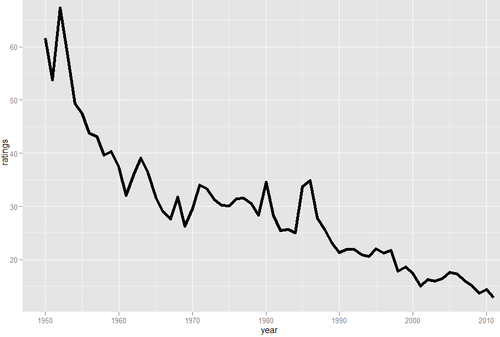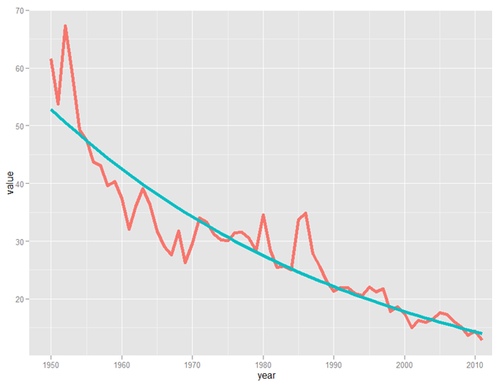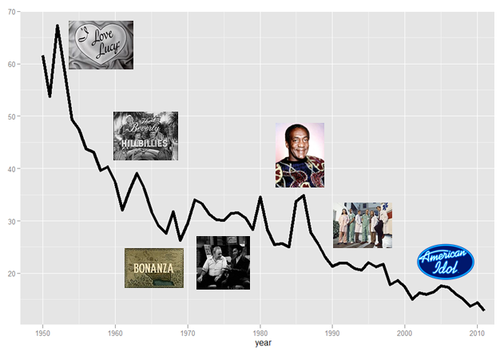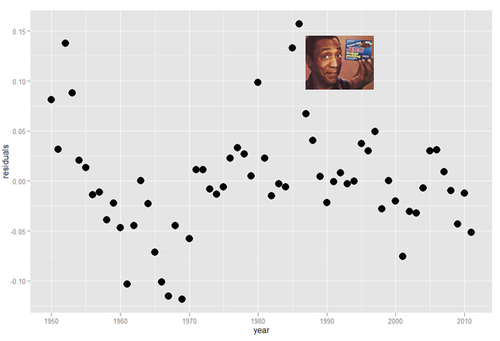Proof that the Cosby Show is the Greatest TV Show of All Time, and How TV and the Web are Trading Places
Recently I took a look at the Wikipedia page for Nielsen ratings and noticed that they list out the most popular show for each year. The most popular show is getting less and less popular every year.

The top-rated show last year, Monday Night Football, had a rating of 12.9, which according to Nielsen means that 12.9% of US TV households watched, on average. The top rated show 28 years before, Dallas, had a rating of more than twice that, at 25.7. 28 years before that, I Love Lucy had a rating of about 50 (and an all-time high over 60 two years before that).
It looks like the Nielsen ratings of the top US show are roughly following an exponential decay curve. I did a quick fit using the nls function in R.

This gets a bit of a statistics caveat* but overall I feel like this is a pretty good sense of how ratings are trending. Based on the trend, by 2029, no show will earn a 10 rating, though frankly that might happen sooner. And if you really want to stretch the limit of time (and credibility) by 2100, no show will be watched by more than 2% of TV-watching households.
Below are some indications of which TV shows had the largest residuals: you can think of these as being the most off-trend. As you’ll see, the sweater reigns supreme when we correct for the era (using residuals in log points)


(all images from Wikipedia, except Cosby images which are from sfgate.com and funnyjunk.com, respectively)
So there you have it: The Cosby Show is the show that exceeded its era in ratings more than any other. It is the greatest ratings champion of all.

(allthingsd)
More seriously, I’m writing this a couple of days after Gangnam Style became the first YouTube video to hit 1 billion views. Granted, I work for a (great) tech company, but I think for a large portion of us, we’re more likely to talk about cultural events that we experience them through the internet than through TV.
When I think of cultural events that I personally experience through media, I think of the Super Bowl and paradigm-shifting news events. I remember being pulled out of class to watch the OJ verdict on TV in grade school. But now more of our shared political and cultural events are experienced together online. I didn’t turn on the TV when I found out bin Laden was dead, and I watched the Pacquiao-Marquez highlights online as well.
At the same time, segmented, niche communities are forming around TV shows. While shows are easy, it takes a larger mental investment now for me to DVR a program and keep up with it than it does to see the new thing online, since we’re so inundated with information. Watching a show live will be a source of pride and almost a status symbol in certain circles, like knowing a band before everyone else or getting a short username on twitter (disclosure- I work on loyalty programs. Sometimes for television programs).
I think the future of TV will look more like the web used to look- tighter niche interest focus and more interactivity, while the internet will serve more and more of the traditional roles of TV and major sites will continue to broaden focus.
*The first thing that jumps out at me here is that the set is auto-correlated (DW=.69). That’s a function of shows lasting more than one year, so the data isn’t truely iid anyways. I actually looked at residuals based on an autoregressive model, but it typically penalized shows that were popular for multiple years, which didn’t seem like a great way to determine the most popular show, IMHO. Anyways, I figured the gist of this is probably enough- TV shows aren’t reaching the wide audience they once were.